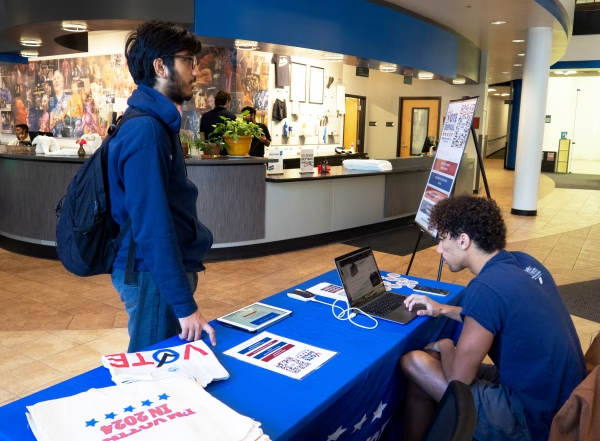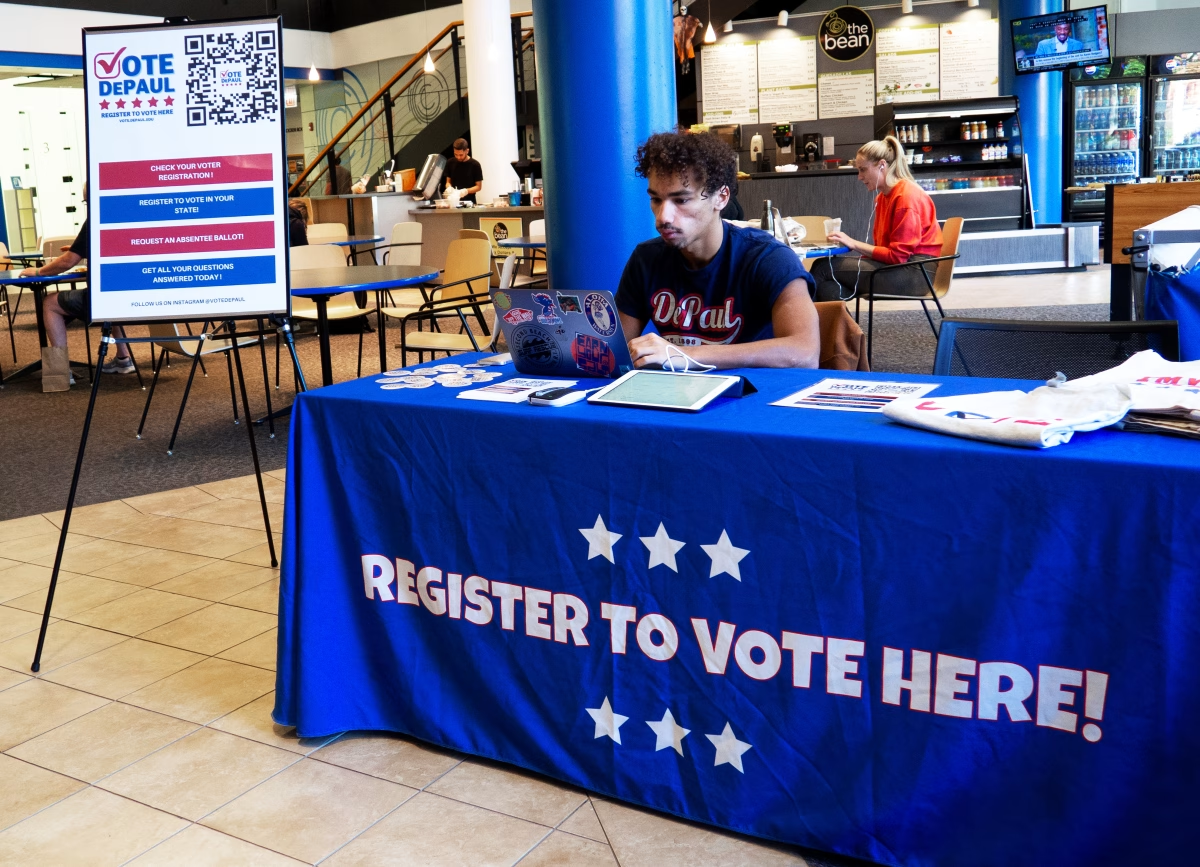Sarah Hendry contributed to this story.
As the 2024 election approaches, young voters could have a big impact in choosing the next president. At DePaul and on campuses nationwide, the push to get students registered to vote is continuing.
The fall 2024 Harvard Youth Poll found that young voters — Democrats, Republicans and independents— are focused on issues such as legalizing abortion, capping prescription drug prices and eliminating taxes on tips.
The Harvard poll has been conducted for more than two decades and is the largest poll on civic attitudes and political beliefs among young voters. The fall poll of more than 2,000 voters, ages 18 to 29, was conducted in September in English and Spanish and has a margin of error of plus-or-minus 2.65 percentage points.
In the poll, Vice President Kamala Harris, held a substantial lead among registered young voters. She received support from 64% of respondents, compared with 32% who preferred former President Donald Trump.
DePaul political science professor, Molly Andolina said that young voters matter because they tend to vote disproportionately for Democratic candidates.
“If they turn out in sufficient numbers, they can have a real impact on the outcome,” Andolina said. In previous elections this has been the case, according to Andolina. “There is a chance it could happen again, especially if students vote absentee in one of the swing states such as Wisconsin and Michigan.”
Corina Chamblin, a graphic design major and junior at DePaul, is voting by mail for her home state of Georgia, an important swing state in this election. This is her first time voting in a presidential election.
“If you’re not registered to vote, you’re not doing what you should be doing because this affects our generation,” said Chamblin. She said she is motivated to vote, in part, to support reproductive rights, as she fears what Project 2025 would mean for her if enacted.
Trump has denied ties to Project 2025, the conservative plan that calls for further restricting abortion access, among other things. However, many Project 2025 authors have connections to his former administration and are campaign donors.
“The most important thing you can do is educate yourself. I don’t think I am the most educated, but I know you must vote how you want the world to go,” Chamblin said, who is casting her vote for Harris.

In the 2024 fall Harvard poll, the majority of young voters disapproved of Project 2025. Of those surveyed, 69% of Democrats, 43% of independents and 23% of Republicans viewed the plan unfavorably.
Nate Benard, a DePaul junior who studies film, has been among those working to register students to vote in the presidential election. He works for Vote DePaul, a campaign under the Office of Student Involvement. His work with Vote DePaul has included working at interactive registration events all over campus with merchandise and games.
“Although you may harbor your own opinions, I think everyone should enthusiastically try to get everyone to vote no matter what they disagree or agree on,” Bernard said, adding that he has encountered many students who are passionate about voting, even if some are still too young to vote.
Benard and others on his team also have helped out-of-state students register to vote in their home states via mail-in ballot.
According to the fall 2024 Harvard Youth Poll, 74% of young Democratic voters said they will vote in the Nov. 5 election, compared with 60% of young Republicans who plan to vote.
The poll also found that young Americans believe empathy, reliability and honesty are essential presidential qualities. Harris leads Trump by 43 points on empathy and 36 points on relatability.
Ezra Grinker, a Wisconsin native and sophomore at Colorado College, is currently on independent study with a political science professor in Michigan, another closely watched swing state.
Grinker has been door knocking with nine other undergraduate students and tabling at Michigan State University, the University of Michigan and Grand Valley State University to encourage people to vote.
“We have been getting good responses on campuses. It feels like many people are registered to vote,” Grinker said.
Although Grinker said he leans more socialist, his theory of change comes from believing there is power in meeting people, including voters, where they feel comfortable, and that change is slow.
“The sociopolitical economic structure that the United States is based on requires the people to be engaged and educated, when the model does not reflect that, the model falls apart,” Grinker said.
Still, he worries that some voters are basing their votes on inaccurate information. “When the public isn’t interested, they’re not being educated, which means they are susceptible to being fed misinformation,” he said.
Editor’s note: A previous version of this story misspelled last name Grinker.
Related Stories:
- Political figures urge Democrats and young voters to “stand up for their values”
- ‘They’re eating the cats’: First and last debate sparks meme-worthy moments and important decisions for undecided voters
Support Student Journalism!
The DePaulia is DePaul University’s award-winning, editorially independent student newspaper. Since 1923, student journalists have produced high-quality, on-the-ground reporting that informs our campus and city.
We rely on reader support to keep doing what we do. Donations are tax deductible through DePaul's giving page.


